Paper wasps and yellowjackets can be some of the most dangerous types of stinging insects. They have the ability to sting repeatedly because their stingers are not barbed. They are not friendly insects to have around, in fact, they can be very aggressive. We know beekeepers use smoke from a bee smoker to control honey bees but would it work on wasps?
Would a bee smoker work on wasps? Yes, a bee smoker would work on wasps. The smoker works as a way to choke out the wasps. When the smoke gets into their nest, it will suffocate most of the wasps. Those that do not die from the smoke will leave the nest and go elsewhere.
Wasps will definitely put a dampener on your backyard picnics and parties. They are dangerous, so smoking them out is one way to get rid of them. Wild smoking is a popular method, there are also other techniques you can use when eliminating wasps from around your home.
If you are in any way allergic to wasp stings we do not recommend trying to get rid of wasps yourself. Have a friend tackle the problem or hire a pest control contractor to remove the nest for you.
Not All Wasps Are Bad
Before we dig into how we go about smoking out wasps you need to know that not all wasps are bad. Actually some wasps are very placid and rarely attack people and in fact they are helpful to have around.
There are two types of wasps:
- Social Wasps
- Solitary Wasps
Social Wasps
Social wasps are the ones that will build the nests wherever they can, in the attic, on eaves, or in trees. Common wasp species that you may find in your backyard or around your house are yellowjackets or paper wasps.
According to an article published by Iowa State University, Yellowjacket colonies can be quite large with up to 5000 wasps. Large paper wasp colonies can have several hundred wasps.
Solitary Wasp
The second type of wasp is the solitary wasp. They usually live underground or in cracks around the home. These wasps stick to themselves and do not have a nest that they live in or protect. These wasps generally aren’t aggressive toward humans or large animals, like the social wasps are.
We recommend just leaving solitary wasps be as they are not aggressive and other pests you don’t want around your house, like spiders.
Bee Smokers and Wasps
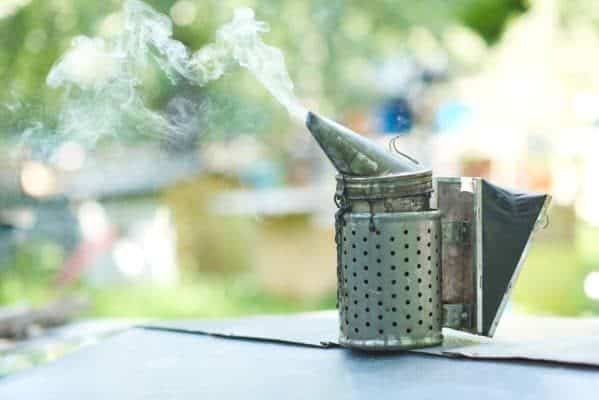
Typically, beekeepers will use smokers to calm the bees before they go to handle them. A certain amount of smoke is a good way to distract the bees from the beekeeper going into the hive.
When the bees see or smell smoke, they automatically think that the “forest” around them is on fire so all of their focus moves to collect honey in order to safely transport it elsewhere. Bees that have gorged themselves on honey are much more docile.
If you are interested we have a whole article on why beekeepers use a smoker on their hives. It would be worth a look if you are considering using smoke on a wasps nest. The article is called, Why Do Beekeepers Use Smoke?
With this knowledge, the beekeeper can use their bee smoker to smoke the hive and go about their hive inspection with a reduced risk of being stung.
There is a range of fuels you can use in a bee smoker. We have an article with a complete list of these fuels. The article is called, Bee Smoker Fuel: You Have Options
This same principle can be applied to wasps. If the goal is to just move the wasps’ nest. However, wasps are naturally more aggressive than bees and bee smokers are designed to be used up close to the hive. So you are going to be at a much greater risk of being attacked in the process and you should dress as most beekeepers would. We will talk about that a bit more shortly.
You will also want to make sure your smoker is clean inside. Resin builds up inside over time reducing the efficiency of the smoker. We have a guide to looking after your smoker which goes into how to clean and maintain your smoker. Check it out before you use your smoker on a wasps nest. The article is called, Step By Step Guide To Lighting And Maintaining A Bee Smoker.
I don’t recommend it, but there are some crazy people that use smoke to get rid of wasps from their nest so they can feast on the wasp larvae. Check out the video which demonstrates how they use smoke to get rid of the wasps. There are also some cooking tips if you fancy a feed of wasp larvae.
Can Smoke Remove Wasps Permanently?
When wasps build a nest in your backyard or under the eaves of your roof, your first thought should be to permanently remove them. As stated before, wasps are more aggressive than bees.
Bees can only sting once because their stingers tear out of their abdomen causing them to die as a result. Wasps, on the other hand, can go in for multiple stings without it causing harm or death to themselves.
To ensure wasps will no longer be a pest in your household I suggest using a large amount of smoke. This will cause the wasps to suffocate. The smoke will ensure the majority of wasps will die, however, some will abandon their nests and relocate. There are different ways to smoke wasps depending on the location of the nest.
In a Tree
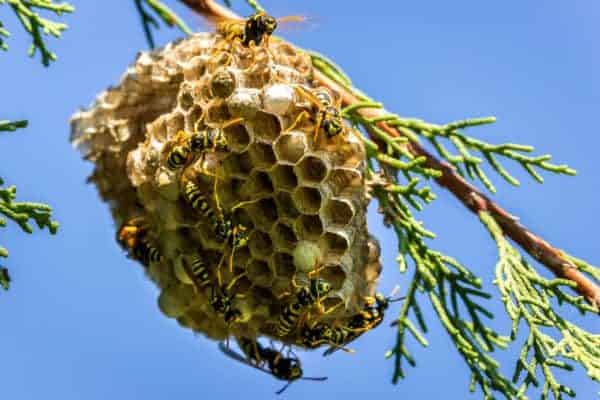
One place that you will commonly see wasps nests is hanging in a tree. With this location, you can light a small fire underneath their nest. When the wind is still the smoke from the fire will drift straight up into the nest, causing suffocation. I recommend doing this at night when the wasps are less active and typically all on or in the nest.
Under the Eaves
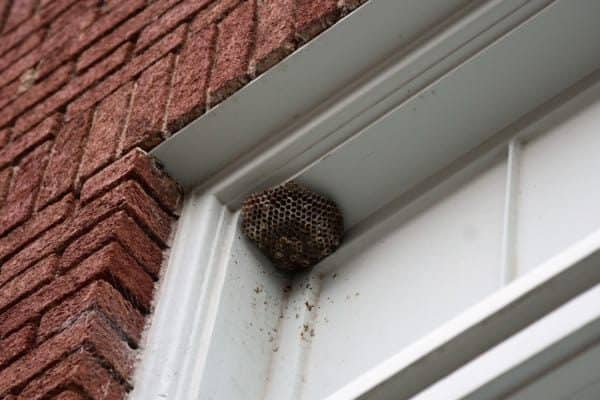
Another wasp nest hotspot is under the eaves of your roof. It is the perfect location for a nest as it is protected from the elements. In order to get the smoke into this area, you will need a cup, cardboard to create a funnel, and some grass.
This is what you will need to do:
- First, you will turn the cardboard into a funnel. With the wider end just large enough to fit snugly over the cup you are using.
- Secondly, you will carefully create a small fire in the cup using the grass.
- Then place the funnel over the cup allowing the smoke from this fire to funnel upwards. Make sure to have the narrow end of the funnel facing the wasps’ nest.
Be very careful handling fire, you don’t want to burn yourself or accidentally set your house on fire.
Using Protective Gear
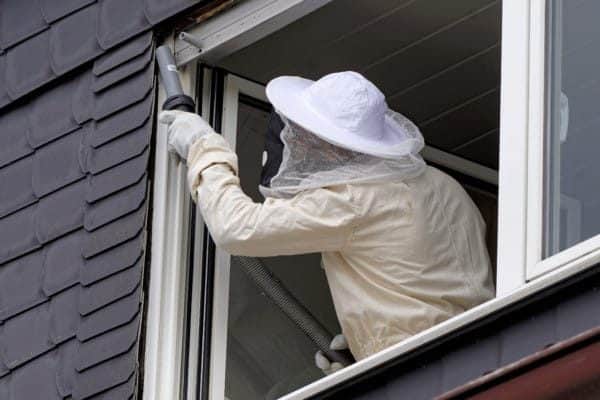
If you are going to eliminate a wasps nest without enlisting the services of a professional it is very important you wear the appropriate protective gear. Even if you are not a professional, there are still everyday items that you can put on in order to prevent yourself from being stung.
- Long Sleeve Shirt: This article of clothing will protect the full length of your arms, as well as your shoulders and back. To prevent gaps, tuck your shirt into your pants.
- Long Pants: Worn to protect every inch of your legs. I recommend you tuck them into your boots.
- High Boots: Wearing boots that reach up past your ankle is key. This way, there is plenty of room to tuck your pants in and minimize gaps. If you don’t have high boots, then you can always wear calf or knee-high socks.
- Gloves: Gloves will protect your hands as they are most likely to come in closest contact with the wasps’ nest. They also provide protection whilst handling the fire.
- Eyewear: Always wear protective glasses, goggles, or sunglasses. You want to keep your eyes covered to ensure that the wasps do not go for your eyes. They will also prevent any smoke irritation.
Adopting correct protective clothing procedures will limit the amount of exposed skin and reduce the risk of getting stung. Wasps will find their way through any gaps to your exposed skin so be sure all loose clothing is tucked in, eliminating any potential openings.
Other Home Remedies to Eliminate Wasps
While smoking is a popular chemical-free method, there are other successful home remedies that can be actioned in order to rid your home and backyard of wasps.
Sugar Liquid Trap
Wasps are attracted to anything that is sugary and gives off a sweet scent. This is why a sugar jug is so successful. A humble plastic jug with a hole cut in the top of it will work. Fill the jug about halfway with 1 to 1 sugar to water ratio. Tie it to a branch that is in close proximity to the wasp’s nest. Once attracted to the sweet smell, their wings will get stuck in the sugary substance.
Honey bees may also be attracted to the sugar trap. If you notice honey bees are getting stuck, please cease using this method as we do not want to kill honey bees.
They will not be able to escape, and they will soon die. You should change and replace the jar every so often because you don’t want other insects or creatures to make their way into it.
Juice Trap
This trap is similar to the one mentioned above. As the name suggests you would put juice, jam, or some other sweet substance into a jar. Put a lid on it with a hole small enough for the wasps to get in, but not out. Then situate this jar on a table near the wasps’ nest. This will attract them, and they will become stuck in the jar once they enter it.

Bug Spray
The last home remedy that can eliminate wasps is the household essential, bug spray. This is not our preferred choice because you are using insecticide. Bug spray, however, can be very effective and is an easy option the building a fire.
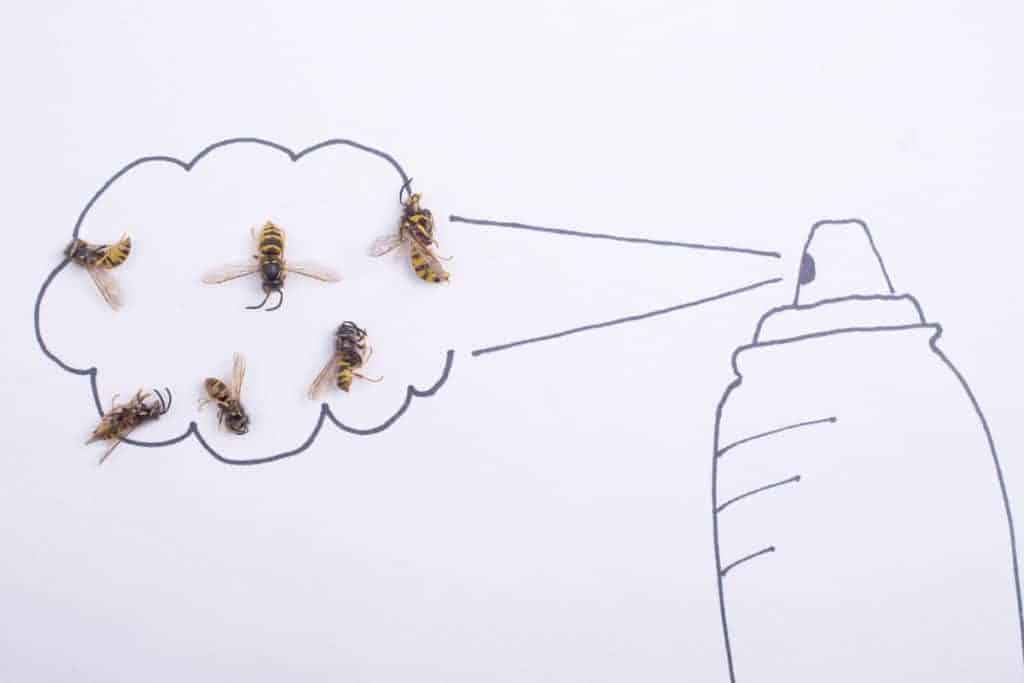
You should still make sure you take steps with protective clothing. If you don’t get them on the first spray and they become airborne, you will quickly become their prime target. You should also make sure your children and pets are not around.
Remember, you have to first know what type of wasp is living in your backyard, social wasps or a solitary wasp. If it is a solitary wasp just leave it be.
The Wrap Up
Wasps can be a real pest. The good news is if you do have access to a bee smoker you can be sure that it will work on wasps. If you don’t have a bee smoker you can use a fire to generate smoke to remove the wasps from their nest. Remember to always be very careful with fire it can easily get out of control.
If you want to opt for the safer bee smoker option you can pick them up surprisingly cheap on Amazon or eBay.
Of course like a lot of things there is more than one way to get rid of those annoying wasps. We prefer chemical-free options. Remember if you are allergic to wasps it is most definitely worth looking for a pest control contractor to exterminate them safely for you.
